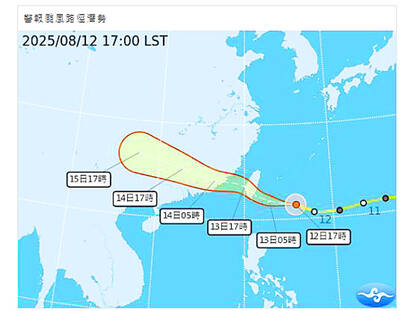Despite repeated displays of goodwill by the government of President Ma Ying-jeou (馬英九) since it came to power in 2008, China’s military preparations for an attack on Taiwan continue to accelerate, a report by the Ministry of National Defense’s intelligence research branch says.
The report says China’s military preparedness for an attack on Taiwan has never been relaxed and that if the People’s Liberation Army (PLA) launched a missile attack on Taiwan, it would destroy more than 90 percent of the nation’s political, economic, military and civil infrastructure. It also predicts the number of Chinese missiles aimed at Taiwan could reach 2,000 by the end of the year.
Although the government’s pro-Beijing policies have been strongly criticized domestically, the ministry’s decision to post the internal research report on its official Web site has raised eyebrows.
Lin Cheng-yi (林正義), a researcher at the Institute of European and American Studies at Academia Sinica, said following Ma’s accession to power, China has moved its military exercises from the coastal areas of Fujian Province to other parts of the country and that it no longer uses Hong Kong media to attack Taiwan.
Lin said that while this was intended to create a more relaxed atmosphere, in reality China’s military threat is constantly growing. The ministry sees through the smokescreen, continues to keep track of China’s military posture and therefore is remaining true to its responsibilities, Lin said.
Although China has reduced the number of military exercises simulating an attack on Taiwan, its activities in the South China Sea and in the waters north and east of Taiwan have been increasing, Lin said.
The report said that a June 1993 meeting of China’s Central Military Commission readjusted its strategic goals, unambiguously making Taiwan its main potential adversary.
Despite Ma’s rapprochement policies, top PLA leaders continue to emphasize in internal meetings that the use of military force must remain an option, the report says.
The PLA’s short and mid-term missile production plans have not been affected by detente in the Taiwan Strait, the report says, adding that the PLA’s missile arsenal targeting Taiwan could reach 1,960 before the end of the year.
A large number of recently decommissioned fighter aircraft have been turned into pilotless drone planes to be used together with Harpy anti-radar unmanned aerial vehicles purchased from Israel. These could help China punch holes in Taiwan’s air defense systems and destroy key targets.
China is focusing resources on developing satellite technology, the report says, adding that the number of Chinese satellites would surpass 60 before the end of this year. Of these, 14 would be Jianbing (尖兵) and Leidian (雷電) military surveillance satellites. The total would also include 15 Shentong (神通) and Fenghuo (烽火) military communication satellites, Xinnuo (鑫諾) broadcasting satellites and 16 Beidou (北斗) navigation satellites. These satellites will help the PLA wage integrated warfare and improve weapon accuracy.
The strength of the PLA Navy is also increasing. Its regular amphibious abilities have also increased, with transport capacity reaching a full division.

DEFENSE: The first set of three NASAMS that were previously purchased is expected to be delivered by the end of this year and deployed near the capital, sources said Taiwan plans to procure 28 more sets of M-142 High Mobility Artillery Rocket Systems (HIMARS), as well as nine additional sets of National Advanced Surface-to-Air Missile Systems (NASAMS), military sources said yesterday. Taiwan had previously purchased 29 HIMARS launchers from the US and received the first 11 last year. Once the planned purchases are completed and delivered, Taiwan would have 57 sets of HIMARS. The army has also increased the number of MGM-140 Army Tactical Missile Systems (ATACMS) purchased from 64 to 84, the sources added. Each HIMARS launch pod can carry six Guided Multiple Launch Rocket Systems, capable of

Tropical Storm Podul strengthened into a typhoon at 8pm yesterday, the Central Weather Administration (CWA) said, with a sea warning to be issued late last night or early this morning. As of 8pm, the typhoon was 1,020km east of Oluanpi (鵝鑾鼻), Taiwan’s southernmost tip, moving west at 23kph. The storm carried maximum sustained winds of 119kph and gusts reaching 155kph, the CWA said. Based on the tropical storm’s trajectory, a land warning could be issued any time from midday today, it added. CWA forecaster Chang Chun-yao (張竣堯) said Podul is a fast-moving storm that is forecast to bring its heaviest rainfall and strongest

TRAJECTORY: The severe tropical storm is predicted to be closest to Taiwan on Wednesday and Thursday, and would influence the nation to varying degrees, a forecaster said The Central Weather Administration (CWA) yesterday said it would likely issue a sea warning for Tropical Storm Podul tomorrow morning and a land warning that evening at the earliest. CWA forecaster Lin Ting-yi (林定宜) said the severe tropical storm is predicted to be closest to Taiwan on Wednesday and Thursday. As of 2pm yesterday, the storm was moving west at 21kph and packing sustained winds of 108kph and gusts of up to 136.8kph, the CWA said. Lin said that the tropical storm was about 1,710km east of Oluanpi (鵝鑾鼻), Taiwan’s southernmost tip, with two possible trajectories over the next one

GET TO SAFETY: Authorities were scrambling to evacuate nearly 700 people in Hualien County to prepare for overflow from a natural dam formed by a previous typhoon Typhoon Podul yesterday intensified and accelerated as it neared Taiwan, with the impact expected to be felt overnight, the Central Weather Administration (CWA) said, while the Directorate-General of Personnel Administration announced that schools and government offices in most areas of southern and eastern Taiwan would be closed today. The affected regions are Tainan, Kaohsiung and Chiayi City, and Yunlin, Chiayi, Pingtung, Hualien and Taitung counties, as well as the outlying Penghu County. As of 10pm last night, the storm was about 370km east-southeast of Taitung County, moving west-northwest at 27kph, CWA data showed. With a radius of 120km, Podul is carrying maximum sustained